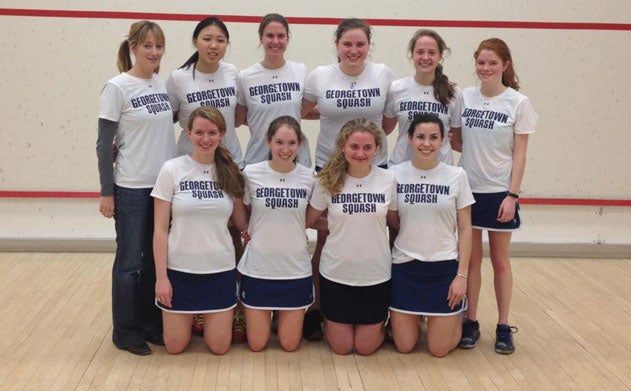Title: Women’s Squash Team Launches Campaign to Support Artificial Pancreas Technology
The Georgetown women’s squash team, which includes a member who competes despite having Type 1 Diabetes, has launched a Squash Diabetes Campaign to support advocacy and human trials to cure diabetes through artificial pancreas technology.

“Last year, we had a wake-up call when Lucy [Gibson (C’15)] joined us as a freshman with Type 1 (juvenile) diabetes,” said Team Captain Carolyn Meister (C’13). “This inspired us to create a campaign to help cure this deadly dangerous disease, which is growing in epidemic numbers.”
According to the U.S. Centers for Disease Control and Prevention, the number of Americans with diagnosed diabetes has more than tripled from 5.6 million in 1980 to 20.9 million in 2010.
Foundation Support
New Generation Foundation is the Washington, D.C.-based nonprofit supporting the Squash Diabetes Campaign. According to its website, New Generation Foundation was established in 2003 to support “bold new initiatives that promote access to opportunity for young people.”
“The Georgetown squash team is essentially providing the inspiration through social media to spearhead the campaign beyond Georgetown and the squash world,” says Coach Adam Pistel. “New Generation is providing the infrastructure to launch and support the campaign into the future, and the foundation directly supports human trials for a cure.
Carolyn Scullin (B’81), a co-founder of the foundation, remains a key figure at New Generation.
New Research
Breakthrough developments in artificial pancreas technology holds the promise of reversing diabetes in humans without the use of harmful immunosuppression drugs, according to the American Diabetes Association.
The new technology, which involves encapsulated islet cells organized into a patch implanted under the skin, is based on NASA-derived technology discovered and advanced by physicist-astronaut Taylor Wang.
Wang is now founder, chair and CEO of Encapsulife, a private corporation working to provide a “living cell/functional cure” for diabetes and other diseases.
Squash Diabetes Goals
One of the goal’s of Squash Diabetes is to help raise awareness about the disease and how it affects an athlete’s life on and the off the court.
“We hope to promote the sport of squash by eventually holding fundraising events,” Pistel says. “Our hope is that the squash community rallies around this cause to help cure a disease that affects many of our athletes, while promoting squash in America.”
Pistel says the campaign’s proceeds will support human trials with artificial pancreas technology to cure diabetes.Individuals may donate to the campaign and get more information by visiting the Squash Diabetes website.
Finding a Cure
Pistel says Gibson she played in what was ranked the 7th matchup of the competition team this semester and is expected to move up as the season continues.
“The team is 2-1 right now with a busy second semester full of matches,” he adds.
Pistel says he hopes to position the team well for the national championships in February.
“Given the conditioning requirements of collegiate squash and the metabolism challenges of diabetes, it is almost inconceivable that a Type 1 diabetic could play this game,” he says. “But we’ve been proven wrong. A Type 1 diabetic, with determination and proper controls, can live a normal life. That said, there is nothing normal about this devastating disease. We need to find a cure and we believe one is at hand.”